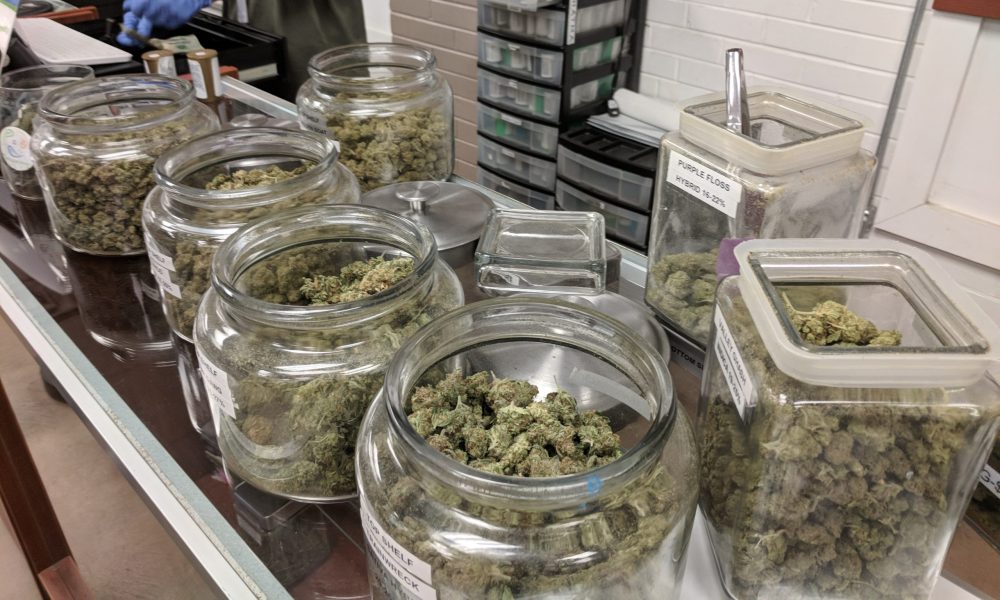Washington, D.C. voters strongly support marijuana legalization and oppose a crackdown on the cannabis “gifting” market that’s emerged in the absence of regulated sales, according to a new poll.
The survey, commissioned by the I-71 Committee and conducted by the firm brilliant corners Research & Strategies, found that 72 percent of likely voters back legalization, and 66 percent said they specifically support the implementation of the District’s cannabis reform law that was approved at the ballot in 2014.
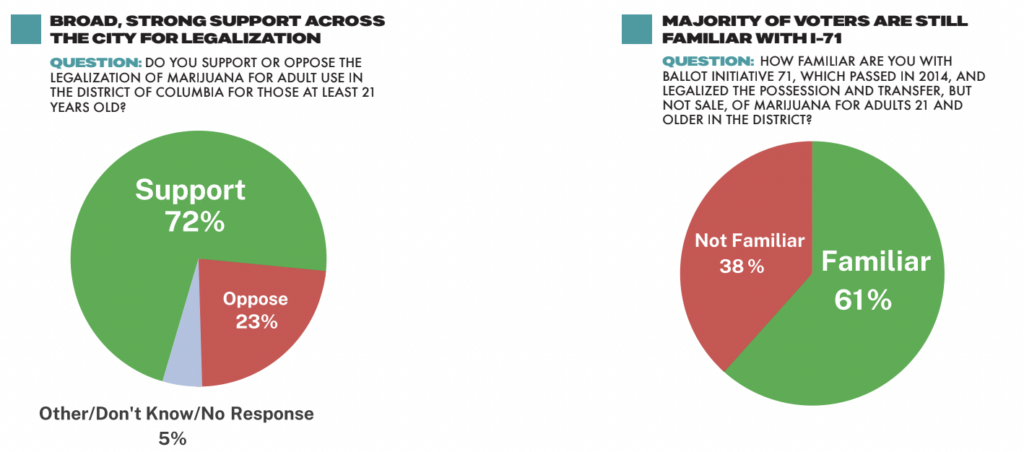
Via i-71 Committee.
That initiative legalized low-level possession, personal cultivation and gifting of cannabis for adults 21 and older. But D.C. has been barred from implementing a system of legal recreational sales under a congressional spending bill rider, enabling an unregulated market to proliferate with some businesses offering “free” marijuana as a gift when some purchases non-cannabis goods and services as a legal workaround.
Local lawmakers and regulators have voiced concerns about the gifting loophole, and several agencies recently formed a “Joint Cannabis Force” to inspect retailers and ensure compliance. However, the plan to start those inspections this month was delayed for unspecified reasons.
According to the new poll, 76 percent of respondents said that they’d prefer for the District to “reform current laws to create a more regulated market” that allows for sales, while 19 percent said that the local government should “shut down the gift economy marijuana market.”
The i-71 Committee describes itself as “a coalition of citizens, industry leaders and stakeholders who are committed to passing equitable, fair, and socially conscious cannabis legislation that prioritizes access for all.”
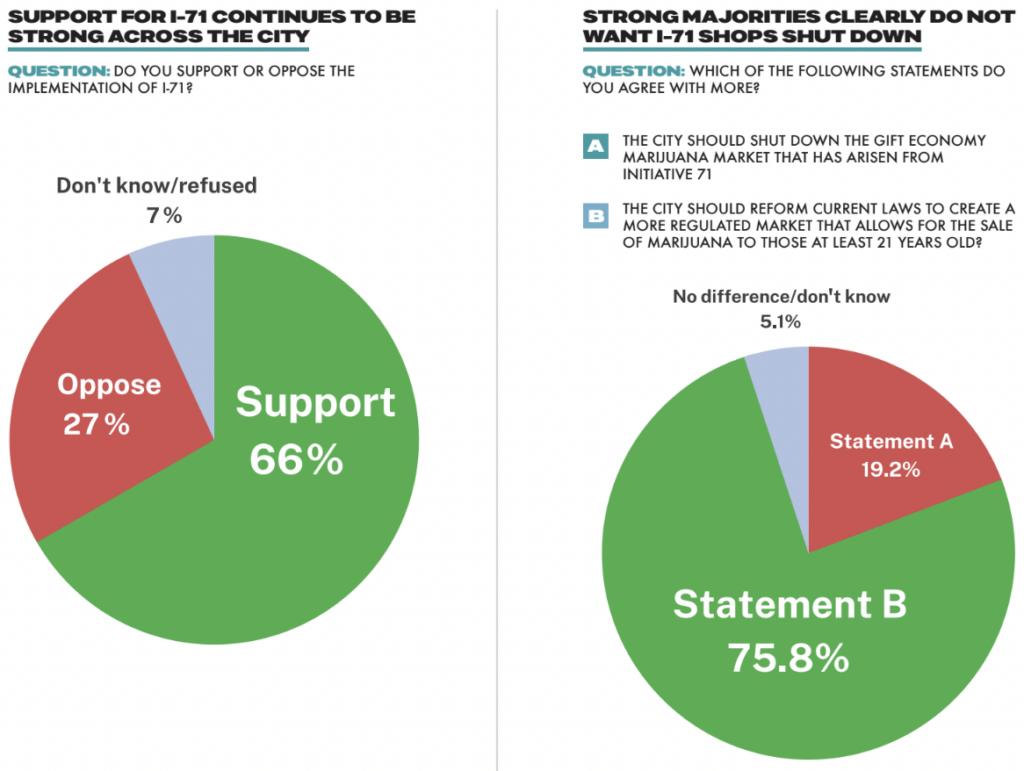
Via i-71 Committee.
Respondents were also asked to rate their concerns about the potential consequences of a crackdown on gifting businesses. Eighty-four percent said they were concerned that enforcement action could put people of color at greater risk of legal repercussions, 70 percent said they worried it would penalize small businesses and 69 percent said they were concerned about increased gun violence, for example.
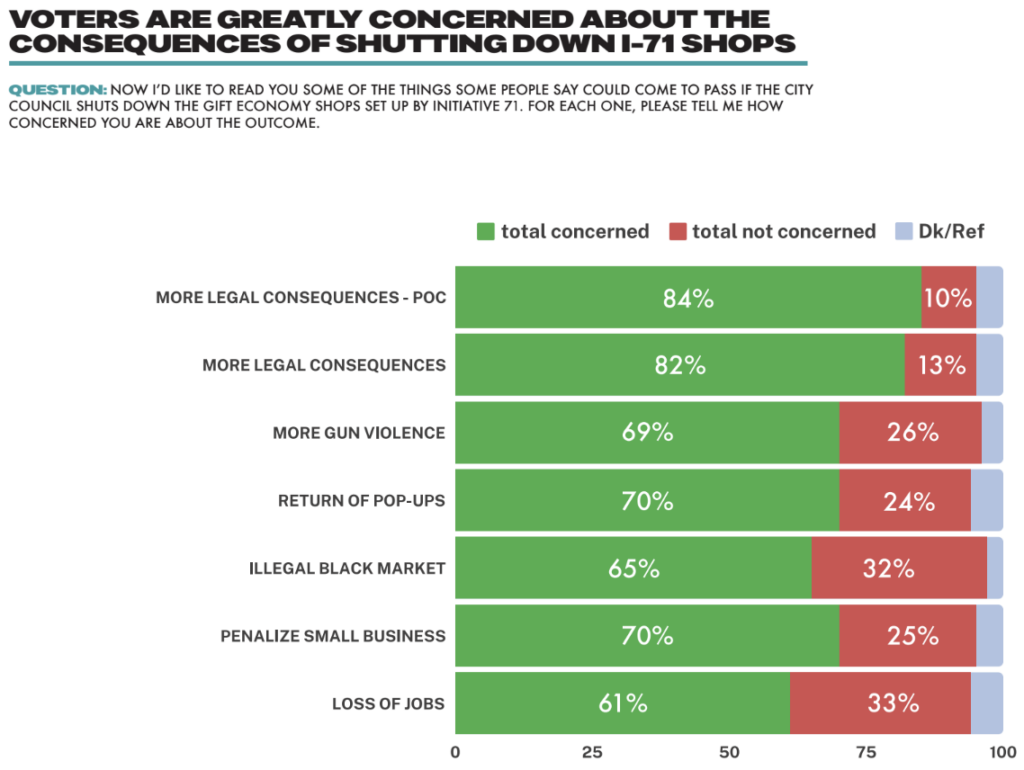
Via i-71 Committee.
Notably, not only did 63 percent of likely voters say they oppose any attempts by the Council to crack down on the unregulated market but 64 percent said they’d also be less inclined to support a candidate who wants to shut down the businesses.
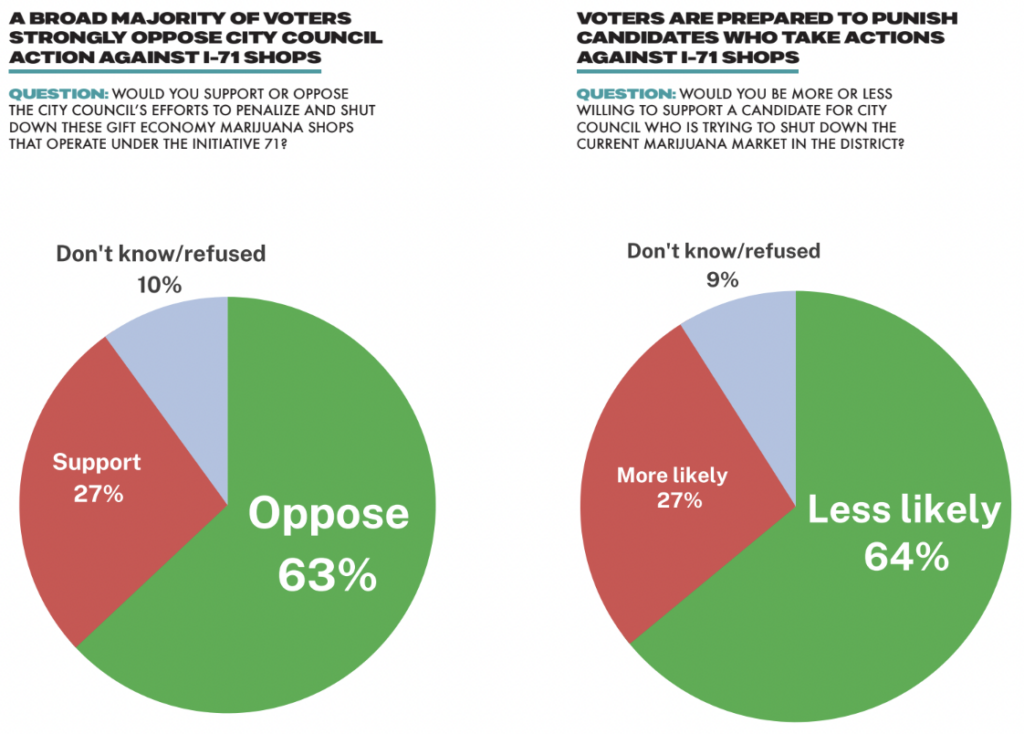
Via i-71 Committee.
Still, while support for regulating cannabis commerce is strong in D.C., the survey also found that most voters think that councilmembers should be focusing more on other issues like reducing crime, promoting affordable housing and expanding access to health care. Asked to rank the importance of 12 different policy issues, respondents were least likely to say that regulating marijuana should be a priority.
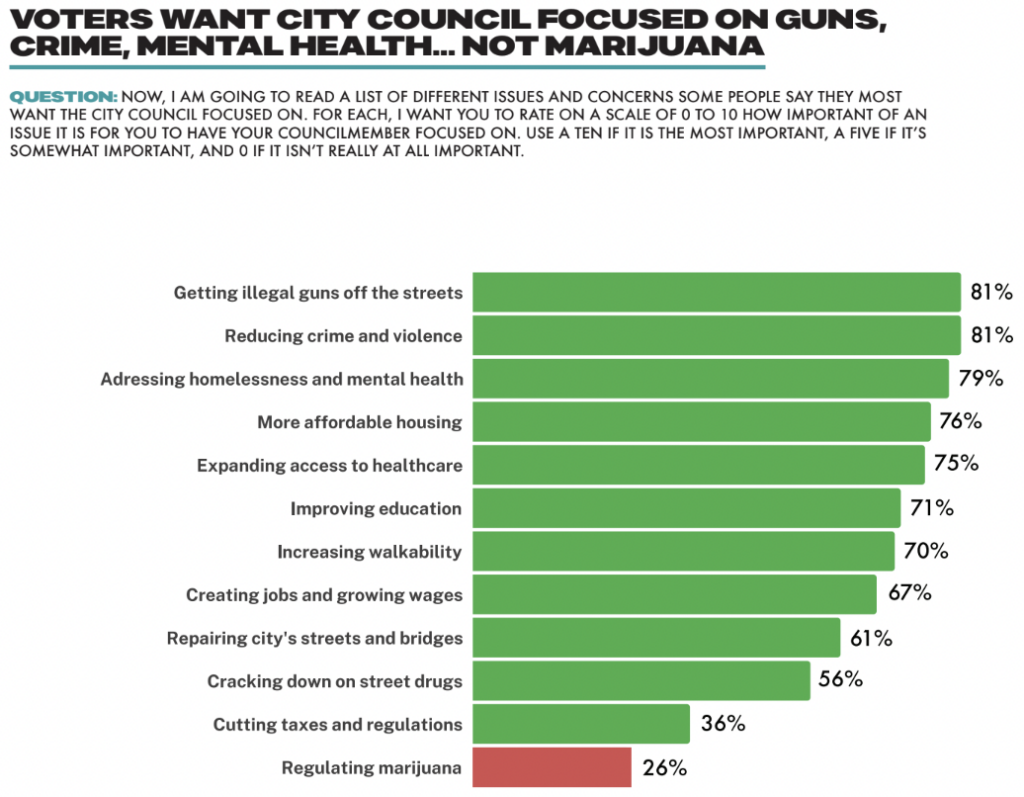
Via i-71 Committee.
“The key takeaway here is this: If the D.C. Council shuts down i-71 stores, it will push the cannabis industry back to the streets,” Terrence White, chairman of the i-71 Committee, said in a press release. “That will lead to more gun violence centered around cannabis sales in our city and lead to an increase in the number of non-violent drug offenses interfacing with law enforcement.”
“It’s also abundantly clear District voters do not want D.C. Councilmembers to act and punish our stores,” he said. “It’s not perfect right now, but punishment will only cause more problems, and we’re here to find solutions.”
The survey involved interviews with 610 likely voters in D.C. from September 6-12, with a +/-4 percentage point margin of error.
Meanwhile, D.C. lawmakers recently sent letters to House and Senate Appropriations Committees leadership, imploring them to remove the rider preventing local cannabis sales as part of Fiscal Year 2023 spending legislation.
“This is not simply an injustice, it is untenable. It is estimated that cannabis sales in the District exceed $600 million annually,” the lawmakers wrote. “A vast majority of these sales are unregulated because of the rider, complicating efforts to ensure consumer and public safety and jeopardizing the financial viability of legitimate medical cannabis businesses licensed to operate in the District.”
The House passed the relevant spending bill for FY 2023 in July, excluding the D.C. marijuana prohibition language. In the Senate, the legislation that’s currently on the table from the Democratic Appropriations Committee chairman also omits the rider, though partisan disagreements have prevented that chamber from acting on any of its spending bills so far this year.
Congress has until September 30, the end of the current fiscal year, to pass a final product. However, it’s expected that lawmakers will pass a short-term continuing resolution that maintains the status quo in the interim, as negotiations continue.
—
Marijuana Moment is tracking more than 1,500 cannabis, psychedelics and drug policy bills in state legislatures and Congress this year. Patreon supporters pledging at least $25/month get access to our interactive maps, charts and hearing calendar so they don’t miss any developments.![]()
Learn more about our marijuana bill tracker and become a supporter on Patreon to get access.
—
President Joe Biden has faced criticism from reform advocates over his last two budget proposals that have included the rider, despite the fact that he’s voiced support for D.C. statehood and for letting states set their own marijuana policies without federal interference.
As Congress decides the fate of the rider, the D.C. Council has separately enacted what is effectively a workaround to the federal blockade, passing a bill in late June that allows people to self-certify themselves as patients under the District’s existing medical cannabis program, through with they can access dispensaries—without needing to get a recommendation from a doctor.
Mayor Muriel Bowser (D) signed the bill about a week after it passed, and in the first month of the new policy coming into effect, the District saw a surge in medical cannabis registrations.
Bowser, U.S. Rep. Eleanor Holmes Norton (D-DC) and other elected officials in the city have routinely criticized Congress for singling out the District and depriving it of the ability to do what a growing number of states have done without federal interference.
Norton told Marijuana Moment in a phone interview in July that she’s “fairly optimistic” that the rider will not be included in the final spending package. She added that the D.C. self-certification policy is an “effective workaround” until then.
The patient self-certification provision of the measure represents a significant expansion of another piece of legislation enacted into law this year that allows people 65 and older to self-certify for medical cannabis without a doctor’s recommendation.
Meanwhile, the mayor signed a bill in July that bans most workplaces from firing or otherwise punishing employees for marijuana use.
The reform is designed to build upon on a previous measure lawmakers approved to protect local government employees against workplace discrimination due to their use of medical cannabis.
While not directly related to the policy change, a D.C. administrative court recently reversed the termination of a government employee and medical cannabis patient who was fired after being suspected of intoxication on the job and subsequently tested positive for marijuana in late 2020. It also ordered the Office of Unified Communications (OUC) to reimburse the worker for all back pay and benefits.
Prohibitionist Group Presses Schumer To Bring House-Passed Marijuana Research Bill To A Vote
Medical Disclaimer:
The information provided in these blog posts is intended for general informational and educational purposes only. It is not a substitute for professional medical advice, diagnosis, or treatment. Always seek the advice of your physician or other qualified healthcare provider with any questions you may have regarding a medical condition. The use of any information provided in these blog posts is solely at your own risk. The authors and the website do not recommend or endorse any specific products, treatments, or procedures mentioned. Reliance on any information in these blog posts is solely at your own discretion.
